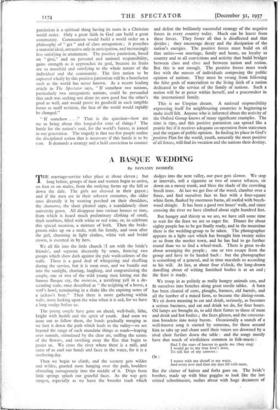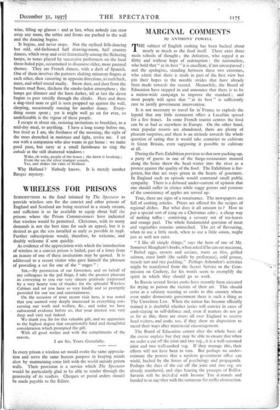A BASQUE WEDDING
IIy BONAMY DOBREE THE marriage-service takes place at about eleven ; but long before, groups of men and women begin to arrive, on foot or on mules, from the outlying farms up the hill or down the dale. The girls are dressed in their gayest ; and if the men are in their soberest costumes, the older ones diversify it by wearing perched on their shoulders, the chamarra, the short pleated cape, a scandalously short university gown. All disappear into various houses or inns, from which is heard much preliminary clinking of small, thick tumblers, filled with white or red wine, or, to celebrate this special occasion, a mixture of both. Then the bride- groom. rides up on a mule, with his family, and soon after the girl, charming in light clothes, white veil and bridal crown, is escorted in by hers.
We all file into the little church (I am with the bride's friends), and separate discreetly by sexes, forming two groups which show dark against the pale wash-colours of the walls. There is a good deal of whispering and shuffling during the service, but it is soon over, and we bundle out into the sunlight, chatting, laughing, and congratulating the couple, one or two of the wild young men letting out the famous Basque cry; the irrintzin, a terrifying yell in a de- scending scale, once described as " the neighing of a horse, a wolf's howl, terminating in a shake like the expiring notes of a jackass's bray." Then there is more gathering within walls, more looking upon the wine when it is red, for we have a long trudge before us.
The young couple have gone on ahead, well-built, lithe, bright with health and the spirit of youth. And soon we issue out to follow them, the bands gradually merging as we foot it down the path which leads to the valley—we are beyond the range of such mundane things as roads—leaping over runnels, stimulated by the clear air, sniffing the scents of the flowers, and swishing away the flies that begin to pester us. We cross the river where there is a mill, and some of us cool our hands, and faces in the water, for it is a sweltering day.
Then we begin to climb, and the scenery gets wilder and wilder, gnarled roots hanging over the path, boulders obtruding outrageously into the middle of it. Drips from little springs splash our grateful faces. As the way gets steeper, especially as we leave the broader track which dodges into the next valley, our pace gets slower. We stop at intervals, roll a cigarette or two of coarse tobacco, sit down on a mossy trunk, and bless the shade of the crowding beech trees. At last we get free of the wood, clamber over a fence, and find ourselves face to face with a four-square white farm, flanked by enormous barns, all roofed with beech- wood shingle. It has been a good two hours' walk, and since crossing the river we have climbed about eight hundred feet.
But hungry and thirsty as we are, we have still some time to wait for the feast we are so eager for. Dinner for about eighty people has to be got finally ready, and in the meantime there is the wedding-group to be taken. The photographer appears in a light cart which has brought him twenty miles or so from the market town, and he has had to go further round than we to find a wheel-track. There is great to-do about arranging the people ; one or two escape from the group and have to be hauled back : but the photographer is something of a general, and in time marshals us according to his will. At last, at about four o'clock, the long-drawn dawdling about of wilting famished bodies is at an end ; the feast is ready.
We troop in as politely as really hungry animals can, and fit ourselves into benches along great trestle tables. A barn has been cleared of carts, ploughs, harness, old barrels, and all the lumber of a mixed farm, to become the dining-room. We sit down meaning to eat and drink, seriously, as becomes a serious business, and eat and drink we do, for four hours. Oil lamps are brought in, to add their fumes to those of meat and drink and hot bodies ; the faces glisten, and the conversa- tion broadens into noisy bursts. Occasionally a snatch of a well-known song is started by someone, for those around him to take up and chant until their voices are drowned by a rival choir further down the table : and the songs mostly have that touch of wistfulness common in folk-music :
Had I the stars of heaven to guide me (they sing) I would go to my true love's door, To tell her of my sorrows :
Or: I weave with my distaff at my waist,
And every now and then my eyes fill with tears.
But the clatter of knives and forks goes on. The bride's brother, made up with blue goggles to look like the last retired schoolmaster, rushes about with huge decanters of wine, filling up glasses : and at last, when nobody can stow away any more, the tables and forms are pushed to the wall and the dancing begins.
It begins, and never stops. Not the stylised folk-dancing but odd, old-fashioned half drawing-room, half country dances, which sway and swirl fantastically among the flickering lamps, to tunes played by successive performers on the local three-holed pipe, accustomed to discourse older, more pastoral themes. They are French dances, with a dash of Spanish. One of them involves the partners shaking minatory fingers at each other, then careering in opposite directions, to rush back, meet, and whirl round madly. Straw dust, and dust from the beaten mud floor, thickens the smoke-laden atmosphere ; the lamps get dimmer and the barn darker, till at last the dawn begins to peer timidly through the chinks. Here and there a dog-tired man or girl is seen propped up against the wall, sleeping, occasionally rousing for another dance. Every- thing seems spent ; yet it might well go on for ever, so undefeatable is the vigour of these people.
I escape at about six, resisting invitations to breakfast, to a mid-day meal, to anything. I have a long tramp before me, but tired as I am, the freshness of the morning, the sight of the trees drenched in moisture and light, revive me. I set out with a companion who also wants to get home : we make good pace, but tarry at a small farmhouse to sing the aubade at the still shuttered windows :
Wake, oh wake, people of the house ; the dawn is breaking ; From the sea the silver trumpet sounds, Yea, and shakes the vales of Holland.
Why Holland ? Nobody knows. It is merely another Basque mystery.

































 Previous page
Previous page